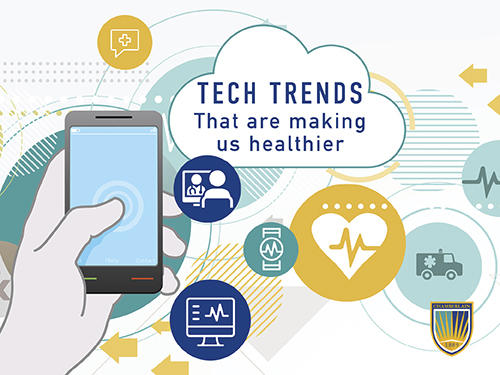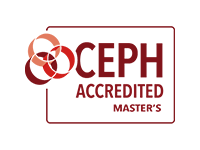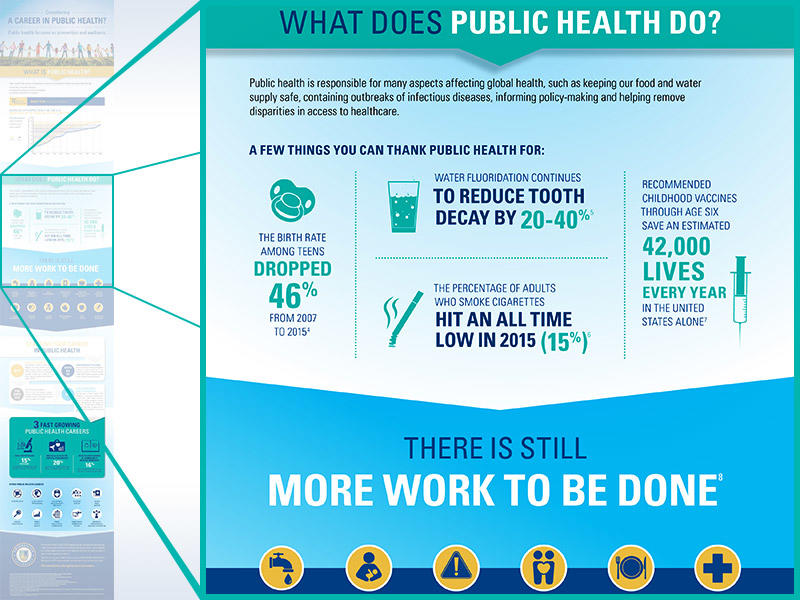Earn Your MPH Degree in as few as 4* Semesters
*with accelerated study
Next Start Date | Sept 02
MPH Curriculum FAQs
At the completion of Chamberlain's Online MPH program, graduates will be able to:
- Articulate the history and philosophy of the professional discipline of public health relative to its core values, concepts, functions and leadership roles.
- Utilize quantitative methods and epidemiologic tools to assess, monitor and review the health status of populations and their related determinants of health and illness.
- Apply evidence-based reasoning and health informatics approaches to the process of program planning, development, budgeting, management and evaluation in public health organizations and public health interventions to improve community health outcomes.
- Specify approaches for assessing, preventing and controlling environmental hazards that pose risks to human health and safety.
- Apply theoretical constructs of social change, health behavior and social justice in planning public health interventions.
- Develop public health programs and strategies responsive to the diverse cultural values and traditions of the communities being served.
- Practice systems thinking techniques and problem solving to understand and respond to the dynamic interactions among sectors, organizations and public health professionals in improving public health.
- Demonstrate leadership abilities as effective collaborators and coordinators within and across organizations and as members of interdisciplinary and inter-professional teams.
- Communicate public health messages to a variety of audiences using public health specific communication and social marketing, including technical and professional writing and the use of mass media and electronic technology.
- Identify and apply the ethical, legal, economic and regulatory dimensions of healthcare and public health policy as well as the roles, influences and responsibilities of the different agencies and branches of government to developing, evaluating and advocating for public health policies.
The generalist focus of the MPH program is designed to prepare public health practitioners to promote healthy living and prevent community health problems such as infectious disease, poverty, health access disparities and violence.
Graduates are prepared to be agents of change, improving health outcomes at the population and community level.
Student Services will support you throughout the entirety of the program. A faculty mentor will also be assigned to you during your Applied Practice Experience and Integrative Learning Experience courses.
Chamberlain has several resources that can help you become acclimated to the online classroom. Once you apply, you will have access to Chamberlain Care Student Success Strategies, which provides information on time management, scholarly writing, using the library and more.
You can also ask your admission representative for a personal tour of the online environment in which you will be taking classes. Or you can view the Online Classroom Demonstration Video Series to learn about what you can expect when you log into your class.
We are dedicated to supporting you throughout your educational journey. To further support your success, a Student Online Readiness Assessment is designed to help assess the skills needed for success in online courses. You will see the assessment listed as a task in the Canvas Learning Management System (LMS) course.

Technology and healthcare are known to go hand in hand. But how does access to technology change healthcare delivery as our global population increases? What is Chamberlain University doing when it comes to technology and public health? How are students prepared to impact public health through technology?
Meet Our Faculty
Chamberlain's Master of Public Health program is led by diverse, active faculty who serve as thought leaders and experts in the public health field.

Sharonda Wallace, PhD, MPH, RDN, LDN
Dean, Master of Public Health Degree Program

Colleen Murray, DrPH, MPH
Associate Professor, MPH Degree Program, College of Health Professions

Michelle Wylie, MPA/HSA
Faculty Manager MPH Degree Program, College of Health Professions

Anne Marie Hodges, MAEd
Applied Practice Experience Manager, MPH Degree Program, College of Health Professions

India Rose
Associate Professor, MPH Program
PhD, MPH, CHES
MPH Admission FAQ
No. However, you can transfer a maximum of six qualifying semester credit hours into the MPH online program. Transfer credit will be awarded for applicable courses with a grade of “B” or higher. Coursework must have been completed within the past 10 years to be considered for transfer. Students in a master’s degree program must fulfill a residency requirement of 36 semester credit hours completed at Chamberlain.
You may expect to complete the MPH degree in as few as two years with full-time study consisting of one course (three credit hours) per eight-week session or two, three-credit courses per semester. There are three semesters per year and the program is six semesters total. The MPH program is taught throughout the entire year.
The online MPH degree program is flexible and can be completed in as few as three-and-a-half semesters by choosing accelerated study. Accelerated full-time study consists of two courses (six credit hours) per eight-week session, six sessions per year, for a total of seven sessions. The ability to accelerate may be impacted by course offerings. This is an intense and rigorous option. Written permission from the Dean is required for each session of the accelerated, 4-semester option.
A minimum of 43 credit hours is required to graduate and earn a Master of Public Health degree.
Join a Proudly Accredited Institution
Are you looking for an accredited online master of public health program?
Chamberlain has university accreditation from the Higher Learning Commission (HLC) as well as Master of Public Health (MPH) program accreditation for a five-year term from The Council on Education for Public Health (CEPH), www.ceph.org.†
Chamberlain University confers online degrees from its Main Campus in Addison, IL.
For a complete list and to learn more, check out our authorizations or view our approvals in your state.
The Council on Education for Public Health (CEPH), www.ceph.org, Board of Councilors acted at its August 26, 2021, meeting to accredit Chamberlain University's College of Health Professions Master of Public Health (MPH) program for a five-year term. The accreditation term extends until December 31, 2026, pending the program's continued documentation of compliance as required by the Council. The effective date of the program's initial accreditation is December 16, 2019. CEPH is an independent agency recognized by the U.S. Department of Education to accredit schools of public health and programs of public health. CEPH assures quality in public health education and training to achieve excellence in practice, research and service, through collaboration with organizational and community partners. For a copy of the final self-study document and/or final accreditation report, please contact Dr. Sharonda Wallace, MPH program dean at MPHProgram@Chamberlain.edu.
Delta Omega Honorary Society
Chamberlain University’s Master of Public Health program is proud to announce the establishment of the Epsilon Psi chapter of the Delta Omega Honorary Society in Public Health. Membership in Delta Omega reflects the dedication of an individual to increasing the quality of the public health field, as well as to the protection and advancement of the health of all people. With membership, eligible students can enjoy a number of benefits including:
- Leadership development and publication opportunities
- Networking opportunities
- Participation in National Day of Service
- Discounted Certified Public Health (CPH) resources
For more information, contact our Admissions team at 888.556.8226, option 1.
Looking for something else?
Explore our related programs.









